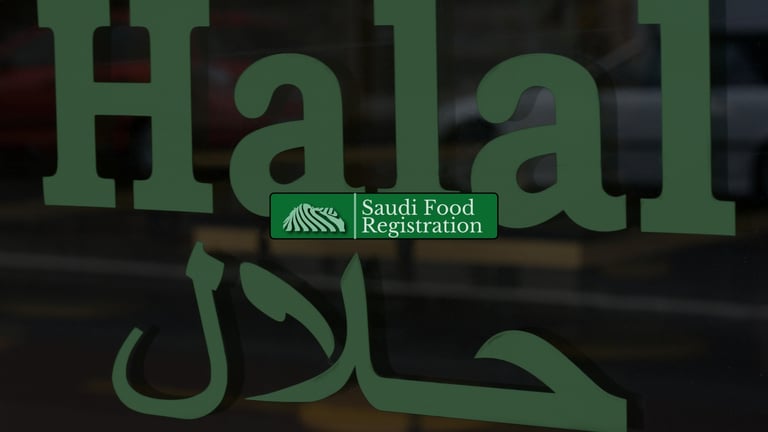Halal Certification for Cosmetics in Saudi Arabia
Halal certification for cosmetics made easy. Follow KSA and SFDA rules to certify your products and expand across MENAT with full regulatory compliance
8/4/20253 min read


How to Get Halal Certification
for Cosmetics in Saudi Arabia (2025 Guide)
The demand for halal-certified cosmetics is surging across Saudi Arabia and the wider MENAT region.
As consumer awareness grows and religious compliance becomes essential, brands can no longer afford to overlook the importance of halal certification.
But what does it really take to get your cosmetic products certified in Saudi Arabia?
In this blog, we walk you through the full halal certification process, clarify the roles of religious authorities and SFDA, and share tips to avoid costly rejection.
Whether you’re an importer, local manufacturer, or private label brand, this 2025 guide is tailored for you.
What Is Halal Certification for Cosmetics?
Halal certification confirms that cosmetic products are free from haram (prohibited) ingredients and that they meet both religious and regulatory standards.
In Saudi Arabia, this is particularly important due to the strict religious compliance expectations enforced by local bodies.
Key Differences from Food Halal Certification
Cosmetic products must not contain animal-derived ingredients from non-halal sources.
Alcohol content must comply with limits, even for solvents or fragrances.
Manufacturing and handling must avoid cross-contamination with haram substances.
SFDA vs. Religious Certification
SFDA (Saudi Food & Drug Authority) oversees regulatory and labeling compliance.
Recognized halal certification bodies handle the religious evaluation, depending on product origin.
Who Needs Halal Certification in Saudi Arabia?
Any cosmetic product intended for sale in Saudi Arabia should consider halal certification, especially if:
You're targeting religious consumers in the region.
You plan to place halal logos on your packaging.
Your formula includes sensitive ingredients (e.g., collagen, animal by-products).
You want to expand to other MENAT countries with shared compliance expectations.
This applies to:
Local manufacturers
Importers and exporters
Private label brands
Retailers offering halal beauty products
Step-by-Step Process to Get Halal Certified
Here’s how the halal certification process typically works in KSA:
Ingredient Review: Submit detailed formula breakdown for analysis.
Third-Party Certification: Work with a halal certification body approved by local authorities.
Document Collection: Prepare a full file of COAs, MSDS, supplier attestations, etc.
Factory Inspection: Some certifications require manufacturing site audits.
Submit to SFDA: Register product with the SFDA, including halal certification proof.
Get Approval: Once all documents are verified, you’ll receive approval for sale.
SFDA Cosmetic Labeling & Claims Rules
Don’t just focus on ingredients. Your halal logo and product claims must also comply with SFDA labeling regulations:
No misleading halal claims (e.g., if only one ingredient is halal-certified).
Logos must match your certifying body.
Arabic language is mandatory on packaging.
Highlight ingredients known to raise flags (e.g., gelatin, glycerin) with halal proof.
Incorrect labeling is one of the most common reasons for SFDA rejection.
Halal Recognition in MENAT Countries
Many halal certifications from Saudi Arabia are recognized in other MENAT nations — but this is not always guaranteed.
If you plan to export your product to the UAE, Qatar, or Kuwait, double-check with your certification body whether your documents meet regional requirements.
Some countries only accept certificates from locally approved bodies.
Common Pitfalls to Avoid
Using a halal body not accepted by SFDA
Assuming vegetarian = halal
Having alcohol-based solvents without percentage disclosure
Forgetting to register the product even after getting the halal certificate
Using outdated ingredient documentation
Why Work with a Regulatory Partner?
Halal certification is not just about ingredients — it’s about knowing how to present your case clearly, align with SFDA expectations, and avoid delays.
Working with a third-party compliance expert in Saudi Arabia can:
Cut your approval time
Prevent costly rejections
Help navigate religious and regulatory overlaps
Guide you through regional export readiness
Frequently Asked Questions
Is halal certification mandatory for cosmetics in KSA?
No, but it is strongly recommended if you target the religious market or wish to display a halal logo.
Can alcohol be used in halal cosmetics?
Certain types of alcohol are permissible within limits, especially if not used for intoxication.
Does SFDA issue halal certificates?
No. SFDA regulates product registration, but halal certification comes from approved religious bodies.
Is a vegetarian product automatically halal?
No. Halal includes ethical sourcing, slaughter method (if animal-derived), and more.
How long does the process take?
It can range from 3 to 6 weeks depending on document completeness and inspection requirements.
Want Help Getting Halal Certified?
Navigating halal requirements and SFDA approval can be overwhelming — especially with changing rules and cross-border nuances.
Let our team guide you every step of the way.
Use the support chat in the bottom-right corner or contact us to get started.
Recommended Reads:
How to Avoid SFDA Delays in 2025
Understanding SFDA Labeling & Packaging Rules
Product Testing & Certification for Saudi Arabia
If you're aiming to avoid approval delays, understand how regulatory intelligence works.
Discover how government liaison services speed up SFDA approvals
